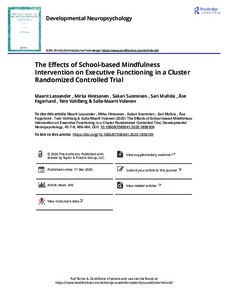The Effects of School-based Mindfulness Intervention on Executive Functioning in a Cluster Randomized Controlled Trial
Hintsanen Mirka; Fagerlund Åse; Volanen Salla-Maarit; Suominen Sakari; Lassander Maarit; Mullola Sari; Vahlberg Tero
The Effects of School-based Mindfulness Intervention on Executive Functioning in a Cluster Randomized Controlled Trial
Hintsanen Mirka
Fagerlund Åse
Volanen Salla-Maarit
Suominen Sakari
Lassander Maarit
Mullola Sari
Vahlberg Tero
ROUTLEDGE JOURNALS, TAYLOR & FRANCIS LTD
Julkaisun pysyvä osoite on:
https://urn.fi/URN:NBN:fi-fe2021042822290
https://urn.fi/URN:NBN:fi-fe2021042822290
Tiivistelmä
Executive functions (EFs) are essential for student's learning and classroom functioning. The current cluster randomized controlled trial examines the effects of mindfulness intervention vs. active control program (i.e., relaxation) focusing on the main EFs (i.e., working memory, response inhibition, cognitive processing, cognitive flexibility and verbal fluency). A total of 131 students from 6th grade and 8th grade (median age 12 and 15) from four comprehensive schools participated. The schools were to equal shares randomized to intervention and active control groups, i.e., groups who underwent a 9-week mindfulness practice or relaxation program, respectively. Participants completed a cognitive test-package at baseline/pre-intervention, post-intervention at 9 weeks and follow-up at 6 months. Both intervention and active relaxation-based control groups improved on a majority of EF measures at both 9 weeks and 6 months. There was no significant difference between the mindfulness intervention group and the active control program in EFs. The current study suggests that mindfulness intervention and active control program do not differ in their effects to EFs, although both may have positive outcomes. Further research with both active and inactive control groups is needed to map the potential benefits of similar programs for cognitive functioning.
Kokoelmat
- Rinnakkaistallenteet [19218]
